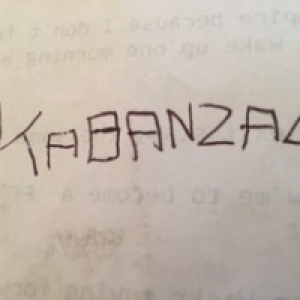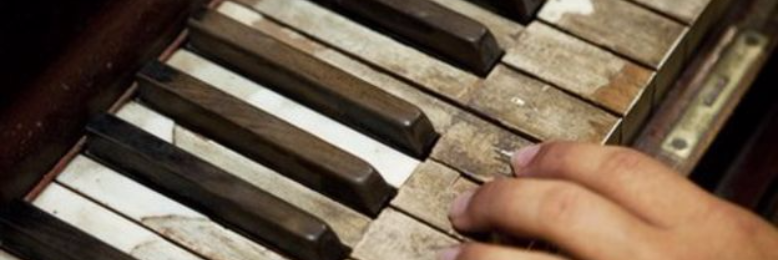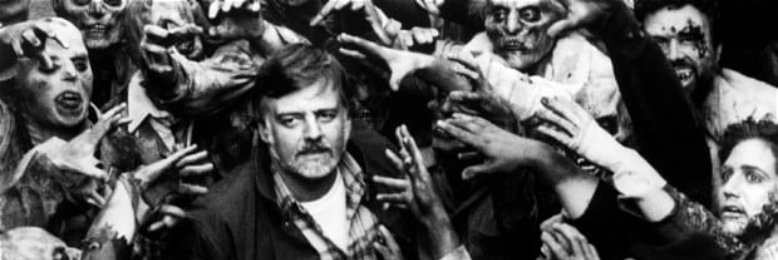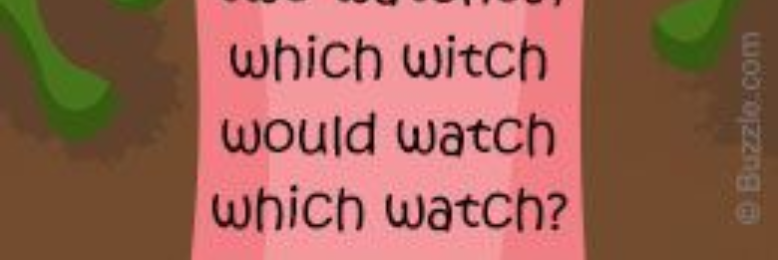The Piano
There was a fly buzzing in the room. The man in the bed couldn’t see the fly but judging by the sound it was near his head and getting closer. He shouted for the nurse even though he knew she wasn’t in the apartment. The fly buzzed around in front of his face and he stopped shouting in order to keep his mouth shut. He breathed forcefully through his nose to discourage it from climbing in there either.
It flew down and landed on his hand. He couldn’t feel it but its presence irritated him. He tried blowing at it only to have it begin its circular buzzing again. This time it landed on his forehead. The apartment door slammed. The man could hear the nurse dropping bags of groceries onto the kitchen table. She waddled into the room with a bunch of tulips in a vase in her hand.
“There is a fly on my face,” grated the man through clenched teeth. The fly was making its way across his temple in the direction of his eye. The nurse crossed the room and set her flowers on the windowsill with the same grunt she made every day. She pushed up the window before walking over to the man. She brushed the fly off his cheek and, when it landed on the wall, killed it with a smack of her fat, capable hand.
The nurse went back to the kitchen to put away her groceries and make herself a cup of tea. She would come when he called or when it was time for her to perform the daily tasks necessary to his existence. Otherwise she would stay in the kitchen. The man accepted this arrangement. She was better than the cheerful, sunny, chattering nurses who tried to perk him up.
The fly wasn’t buzzing anymore but with the window open he could hear a group of boys playing down in the street. Their laughter grated his already raw nerves and the sound of their sneakers scuffing the pavement pained him. He tried to ignore it but the frustration he was already feeling built until finally he shouted for the nurse. He had to shout twice before he heard her footsteps in the hall and it didn’t help his mood.
“Shut the window,” ordered the man.
“No,” said the nurse, and she turned to go back to the kitchen.
“Come back here. Close that window. I don’t care what those doctors say I don’t want fresh air. I want the window closed,” he shouted louder with each sentence, knowing that she was still walking away. She didn’t respond but the boys down below, hearing his yells, got nervous, and muttering to each other, took their game somewhere else. He could tell this was going to be a bad day. The angry days were bad days.
The worst moment was when he caught the smell of cigarette smoke. The nurse wasn’t supposed to smoke in the apartment but sometimes she cheated. The smell triggered the old craving and took him back to the last cigarette he ever smoked, on the roof of the hotel that night. He could remember every movement, every breath, right down to the last flick of his fingers that sent the butt spinning off into space before following it over the edge. It had been such a simple gesture. So easy then. So impossible now.
Looking back, he couldn’t remember why it had seemed so important to end it all. Why had that jump been the obvious solution? He was going to lose everything. That was it. That was what finally drove him to try suicide. He laughed darkly to himself. He knew better now. Losing things, losing position and prestige, that was nothing. Losing everything was not being able to smoke a cigarette, not even being able to die, without help. When they picked him up off the pavement in front of that hotel he should have been dead. No one saw the irony except the man who found out what it really meant to lose everything.
He slept badly that night. By morning he was exhausted enough to ignore buzzing insects or children in the street. He lay and stared at the wall without seeing it for hours on end. Only when the nurse came to change his position and adjust the bedclothes did he notice his surroundings. She was kind in her own way, bullying him, poking and pushing him when she wanted him to move, muttering under her breath as if the limbs that didn’t work were his own fault. After all, they were.
The lethargy lasted for days. It was easier to maintain than the anger. Then one morning the sound of furniture moving in the apartment above disturbed the man. Listening to the sounds he realized that someone new was moving in. He wasn’t pleased about the change, especially when the sound of a little girl’s voice drift down to him through the open windows.
At first every noise the family above him made irked the man and he was nastier that usual to his nurse but after a few days they began to fade into the background of his life and he was able to block them out like everything else.
They had lived there for perhaps a week when someone in the apartment above began to play on an out of tune piano. The man in the bed groaned as the discordant notes came down through the floorboards. It was bad enough that someone was trying to make music in his hearing. The least they could do was tune their instrument. Even the disgusting noise, so off beam that it couldn’t really be called music took him back to a different time, a time when music had been everything to him.
The man shouted for the nurse, and when she came he ordered her to shut the window. A gruff order was given upstairs and the non-music stopped, temporarily. But not the thought process it had set in motion. He was sitting in front of a piano again, in his parent’s house, on another summer’s day. Playing for hours, mind and body focused entirely on the music, even his breath rising and falling with its rhythms. Only stopping when the maid brought in a tray and refused to go away until he’d eaten. Working towards perfection with a single mindedness that bordered on obsession.
And it had paid off. He had been the best. He had played in that same trance-like state before audiences of thousands and been physically shocked to look up at the end of a piece and see them there, hear their applause. Lying alone in his bed, staring out at the clouds sailing by, he could still hear that applause. He was grateful when the sound of heavy boots walking across the floor above him pulled him out of his reverie.
The gratitude was short-lived. As soon as the footsteps were gone the off-key music began again, very quietly but still painfully clear. He turned his head from side to side on the pillow, covering first one ear and then the other, trying to block out the sound but it continued for what felt like hours while he lay in an agony of mounting rage.
Days went by and the man realized that it must be the child playing. The ill tuned instrument only played after school let out and before the heavy-footed father returned from work. That was already too long from the man’s point of view. He began to dread the hours spent as a captive audience to a piano player apparently oblivious to the awfulness of the music she was making. The boys who played ball in the street hardly bothered him any more as he was filled with genuine hatred for this little girl musician.
It surprised him one day to realize he had begun to think of her as playing music and not just making noise. It had nothing to do with the quality of sound. The notes were as wrong as ever, but despite himself he began to pick out what those notes would have been if they were only what they should have been. He began with a natural musician’s ear to correct the tuning in his own mind, and to hear the complexity being played.
It is weeks before he allowed himself to listen objectively, but when he did he realized that the timing was always perfect. He listened to the rise and fall of the incorrect notes and he heard the fact that she must time even her breathing to the music she played to have it flow the way it did. He began to recognize that if the instrument where not so warped the pieces being played were truly amazing for a child. But never complete. There were snatches of songs, the sort that a person might catch standing outside of a concert hall when the door opened.
Somewhere, at some point, this child must have run her fingers up and down the keyboard of a perfectly tuned instrument, have heard exactly where each note was and remembered the fact. And now, anything that came past those little ears was played as it should be played, by ear and by memory both. The natural skill required for such a feat was astounding. It felt like waking up as the man recognized another person who needed music so badly that they would play anything, even something as awful as that beast of an instrument upstairs.
In the corner of the man’s room, out of site from where he lay in the bed, was a very old, very plain piano. Its appearance was deceptive. There was nothing simple about the music he had played on it once. It was the only thing he had loved enough to hold onto after he chose to throw his life away. The child had been playing her awful scraps of melody for over a month when the man ordered his nurse to call an expert tuner he used to know.
He chose the time when the tuner should come very carefully, and his orders to the nurse in preparation for his arrival were precise. When the tuner arrived, the dreadful piano upstairs was playing and the tuner grimaced in sympathy toward the man.
“That must be enough to drive you mad,” he said.
The man merely grunted in reply. The tuner got on with his job. Running his fingers up and down the keyboard first in chords then arpeggios he tested the instrument’s accuracy. There was very little discrepancy, even after all that time. When he opened the top he only needed to adjust the strings very slightly. His fingers lingered on a series of rich, mellow chords that perfectly brought out the piano’s tone. There was a slight sound from the doorway of the room and he looked around. A young girl was standing there, very still, her eyes locked on the piano as if she had never seen one before.
She stepped carefully across the room to stand beside him. The tuner looked over at the man in the bed that had been turned from its usual position so that he now faced the piano. The man jerked his head at the tuner so he stood up and gestured to the child to sit. Her hands were still to small to reach an octave, but she held her fingers delicately curved above the keys.
What she played was only a bit of the original Sonata, but it came to life in that small, bare room. She couldn’t have been more than ten years old. Everything she wore was cheap and worn. She was so shy it was painful, but none of that mattered when she played. When she turned to look at the man in the bed she wasn’t smiling, she was too afraid for that, but her eyes glowed.
“You can leave now,” the man said to the tuner. The girl got up from the piano to follow him out of the room.
“No, you stay,” said the man in the bed, “Look in that cupboard, there in the corner. On the second shelf is a sheaf of music. In it is the rest of the piece you were just playing. Only you were playing a later rendition, that one is the original. Under it is a record, put it on that machine there and listen to it so you can hear where the notes are until you can read the music.” The child obeyed and music he had recorded long ago floated out of ancient speakers.
The man’s life didn’t change very much from that day. He was still alone most of the time. He was still unable to lift a finger for himself. But where there had been despair there was purpose. Where there had been emptiness there were plans and goals and the anticipation of a few short hours every afternoon when once again his genius could flow out into music, this time through the medium of a child.
At the end of the school day she would appear at the door, always waiting to be invited in. What the man offered could hardly have been called an invitation, but it worked.
“Come in here,” he would bark, “Play me the piece you played yesterday, and remember what I told you about…” and on it would go. No teacher could have wished for a better pupil. The girl was as focused, as dedicated, as he had ever been himself. And in return he taught her to bring out the nuances of a song that could take it from a rippling brook to a thundering cascade from one bar to the next. He taught her the steps to greatness.
The growth in her music showed in the child. Drooping lids no longer hid the glow in her eyes. The smiles that at first trembled at the corners of her mouth burst forth when she felt the shock of a rushing finale. Even the grunting nurse found tasks to busy herself with in the room during those afternoons. She didn’t frighten the child. The girl seemed to understand the approbation behind the silences, to hear the praise in the grunts and she responded with affection in her quiet way.
The sound of her father’s boots broke through the spell of the music each afternoon and the girl would stop, her fingers poised above the keys to listen until they had passed upstairs. Then she would slide off the bench and go to where the nurse was working and stand beside her just for a moment, near enough to touch, but not. She would walk over to the man in the bed and this time she did reach out, her fingers just touching the back of his hand as it lay on the covers before she slipped away upstairs. The man could almost feel that touch.
One day the girl was late for her “lesson”. It was the first time in months she had not run up the stairs after school to begin playing as soon as possible. The man in the bed began to be restless and angry. When the nurse came into the room he growled to her, “How does she ever expect to excel if she doesn’t have the dedication to practice for a few hours?”
The nurse didn’t answer. She was looking toward the doorway. The girl stepped into the room.
“Daddy got laid off,” she said. The situation clearly wasn’t new to her. “We are behind on the rent. We catch the midnight train to the country. My uncle will give Daddy work. We are to be grateful.”
She walked over the piano and touched the keys with the tips of her fingers. Just brushed them without making a sound. She turned and looked at the man in the bed and her eyes said the words her lips couldn’t voice. She walked out of the room and up the stairs. They could hear the sound of feet walking the floors and muffled voices. Very little furniture was moved, that would have to stay to cover debts. The girl did not come back to say good-bye, but the man could hear her father’s boots on the stairs and her mother’s voice moving away down the street.
The nurse went back to the kitchen. The man stared at the wall and tried not to see even the shadows, tried not to hear even the wind, tried to put up the blank wall of unfeeling between himself and his surroundings. But even as he felt himself begin to sink the sound of boys shouting penetrated his concentration. He bellowed for the nurse and after a moment she stumped into the room.
“Close the window,” he ordered.
“No,” she said, and turned to go back to the kitchen.
“Wait,” he cried, and the desperation in his voice must have penetrated because she paused.
“If you won’t close the window,” he said, “At least get a pen and paper and write something down for me.” She left the room without a word but a minute later she was back with a bit of pencil and a piece of brown paper bag. It would have to do. It took an eternity for her to find a pocketknife in a drawer and shave the end of the pencil to a workable sharpness but finally she was ready. She balanced the paper on her broad knee and looked at him. What he told her to write she wrote, and she took the piece of paper out on the errand he asked her to run.
A week later she answered a knock at the door. The teenager she showed into the man’s room was dirty and unkempt. His oily hair hung unevenly on his shoulders. His jeans were out at the knees and it was impossible to tell what the original color of his leather jacket had been. In his hand, he held a newspaper. He stared at the man, lying there in his bed. He looked around the room and saw the piano. Finally, he held out the paper.
“It says you’ll teach people no one else can teach any more,” he said, “Is it true?” It sounded more like an accusation than a question.
“Sit down at the piano and play me something,” said the man. “We’ll see.”
Dandelion A Miracle Drug
Dandelion A Miracle Drug
Dandelions growing like a weed you say
get out the poisons get out the spray
Dig it up stomp it out its a weed
no weeds allowed in my lawn indeed
I hear its a miracle drug a mystery
depending on your own body chemistry
Prevents or cures for some diseases
acts as a tonic a gentle diuretic it pleases
To purify your blood and cleanse your system
improve gastric-intestinal health pistons
No negative side effects to turn you blue
and selectively act on only what ails you
Do as you please, keep or kill or say it is fine
but I will continue to drink my dandelion wine
© Julia A Knaake
my soul
They stared right at me
Like they'd never seen a walking goddess.
But that's just immortality, my darling.
People are born.
They live.
They are lucky to have survived.
Then finally, in the blink of an eye,
Death prevails.
The eternal being we all once looked forward to,
Hoped for,
Ceases to exist.
We are left as dust, ashes.
Remains of the past to be looked upon by future scientists.
"How did she eat breakfast?"
"What did she use this bone for?"
Our entire lives-
Everything we did out of the risk for survival,
Along with judgement and error,
Lead to absolute nothing.
There is nothing to look forward to,
Nowhere to go.
I am stuck in this purgatory
With not even an ounce of hope left in my soul.
Alliterated alliterations alliterated as alliterations
Alliterative additions are always achievable, as all adequate authors agree, and almost any advice asserts; actually, awesome adjectives also add atmosphere and, after all, adjustable adjuncts are amazing, although, alternatively… Actual alliterations as "An able advertising artist approaches all accounts as above average. Amateurs aside, all ad-men are against amorphic attitudes. Advertise aimlessly and advertisements are arid. Advertise abstractly and advertisements abbreviate audiences. Albeit, advertise aggressively and adeptly and adapt as awesomely as an animal, and additional assets are again and again accumulated as an aftermath." are also actual. All actual alliterations are awesome, and all alliterations alliterate all alliterations. Alliterations are awesomely amazing and althemore achievable.
A Challenge from Charlotte
Charlie chose chocolate chips and cheddar cheese over cheap chopped cherries to charm Charlotte, a chess champion from Chicago, who challenged and cheated on him in Chinese checkers and chastised him to chew chili, chase cheetahs, change into a chimpanzee, chat like a chipmunk, chomp a chockful o' Cheerios, and cha-cha on a chair while chuckling with her chubby chow chow.
Never Ending Result
She came to collect what she shared with me
Once, they were ours...now they're just hers
She took more than that, she took her words
It wasn't fair for me
Well, these actions were not
But her last words...
I forgot
It doesn't matter what she said
Or how I responded
But the moment...
Ruby red
I have no intention to pawn it
Angles & cuts of formed dimensions
Now glistening through the words we mention
Settling in a space where Love once belonged
Filling the air with music...not songs
Complimenting each other's notes
We see that Love is but a moat
A trench we must face
A barrier thats keeps safe, the castle of its grace
It is to be conquered, by only the meek
The strong will fail...the cunning will sneak
The powerful will trail...& the daring won't peak
All will know, Love is not for the weak
We found out the hard way
And we've come to our end
But before she goes away
We talk...as friends
The world is swirling around us, throwing dismay in swarms
But inside her car, there is peace & warmth
As if we've forgotten...for just a moment
Our current state...the upcoming torment
We can't go on together, so we leave apart
But we're reminded why there was a start
Swim
Chlorine was my perfume for the past eight summers. My skin dry from the pool and my hair too rubbery for my liking. The summer sun blazed upon the pool lanes. Everyday my eyes were left with rings around them, which left a very sad circular tan line that matched my cap tan line across my forehead. Every morning, waking too early to my dismay. Saturdays from four in the morning to two in the afternoon were spent racing.
Despite all of the above, every damn time I entered the water I felt alive. Water, if it was the lake or ocean or pool, I'd find comfort in the chilling, freeing substance. It felt as if I was soaring, hovering, gifted with something beautiful and magical. The water was my home. It will always be the place I go to clear my head, where nothing else matters.






